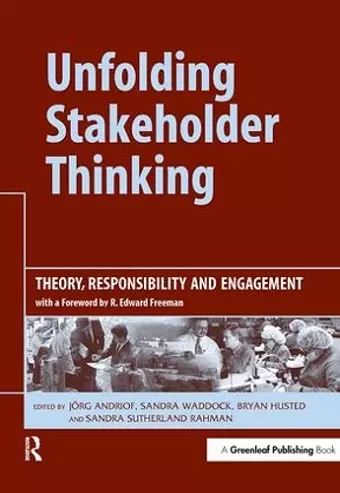Unfolding Stakeholder Thinking
Theory, Responsibility and Engagement
Sandra Waddock author Bryan Husted author Sandra Sutherland Rahman author Jörg Andriof author Sandra Waddock editor Jörg Andriof editor
Format:Hardback
Publisher:Taylor & Francis Ltd
Published:1st Oct '02
Currently unavailable, and unfortunately no date known when it will be back

Argues that, today, stakeholder thinking has evolved into the study of interactive, mutually engaged and responsive relationships that establish the very context of doing modern business, and create the groundwork for transparency and accountability. "The work that needs to be done in order to rescue business from the moral scrapheap is being done by the authors and editors of this volume ... The right book at the right time." R. Edward Freeman
Today's successful companies are those that recognize that they have responsibilities to stakeholders that go beyond mere compliance with the law or meeting the fiduciary responsibility inherent in maximizing returns. This book focuses on engaging stakeholders for long-term value creation.
This book – the first of a two-volume series – argues that, today, stakeholder thinking has evolved into the study of interactive, mutually engaged and responsive relationships that establish the very context of doing modern business, and create the groundwork for transparency and accountability.
This book makes it clear that in today's societies successful companies are those that recognize that they have responsibilities to a range of stakeholders that go beyond mere compliance with the law or meeting the fiduciary responsibility inherent in maximizing returns to shareholders. If in the past the focus was on enhancing shareholder value, now it is on engaging stakeholders for long-term value creation. The process of engagement creates a dynamic context of interaction, mutual respect, dialogue and change – not a one-sided "management" of stakeholders. Indeed, the authors believe the very term "stakeholder management" to be outdated and corporate-centric. Companies can manage their relationships with stakeholders, but frequently cannot actually manage the stakeholders themselves, because, as the activist and collaborative initiatives described in this volume suggest, company-stakeholder relationships are not one-way streets and different institutions bring different agendas, goals and priorities to the engagement.
There are clear implications to the way in which stakeholder thinking is unfolding today. If in the past corporate "social" responsibility was simply seen as profitability plus compliance plus philanthropy, now responsible corporate citizenship – or corporate responsibility – means companies being more aware of and understanding the societies in which they operate. Corporate responsibility means recognising that day-to-day operating practices affect stakeholders and that it is in those impacts where responsibility lies, not merely in efforts to "do good". Companies are now faced with a wide array of challenges that mean that senior executives and managers need to be able to deal with issues including greater accountability, human rights abuses, sustainability strategies, corporate governance codes, workplace ethics, stakeholder consultation and management. Stakeholder thinking needs to capture these new realities.
The global reach of multinational corporations has served to highlight the need for the (re)integration of business into society, relationships...
Centrally, this book offers new theories with which to understand business as an organic part of the global social system, and if you take time out for this, it might change your outlook ... you will see that stakeholder thinking does not demand that firms lose resources by forcing together commercial and philanthropic objectives that are essentially cross purposed. Instead it demands that they reconceive their commercial objectives, having recognised and re-evaluated the role that stakeholders already play in their operations ... within this book you will find ... a vision with which to refine your sense of purpose. - Ethical Corporation
Greenleaf have produced an excellent "manual" of stakeholder theory, practice, engagement thinking and perception which should grace the office shelf of any practitioner who works with all or some of the stakeholder sector. - Eagle Bulletin
Business leaders, advocacy groups and others with an interest in corporate and stakeholder behaviour will find this book to be an important contribution. The papers provide a very readable guide to existing research. The extensive, up-to-date bibliography will prove invaluable to anyone interested in further exploring the issues ... - Natural Resources Forum
... the volume demands detailed study. Overall, it moves the study of stakeholder theory from a legitimacy perspective ... to an increasing concern with stakeholder dialogue, leading to engagement of stakeholders in organizational decision-making processes ... - Social and Environmental Accounting
This volume brings together leading academic thought on stakeholder thinking. While [the] focus is on corporations, and it is mostly aimed at corporate managers, NGOs and academics, it, too, contains valuable insights for (local) government officials that will find that they share a lot of the framework and problems analysed. - European Circular Issue 21 (Autumn 2004)
ISBN: 9781874719526
Dimensions: unknown
Weight: 725g
320 pages